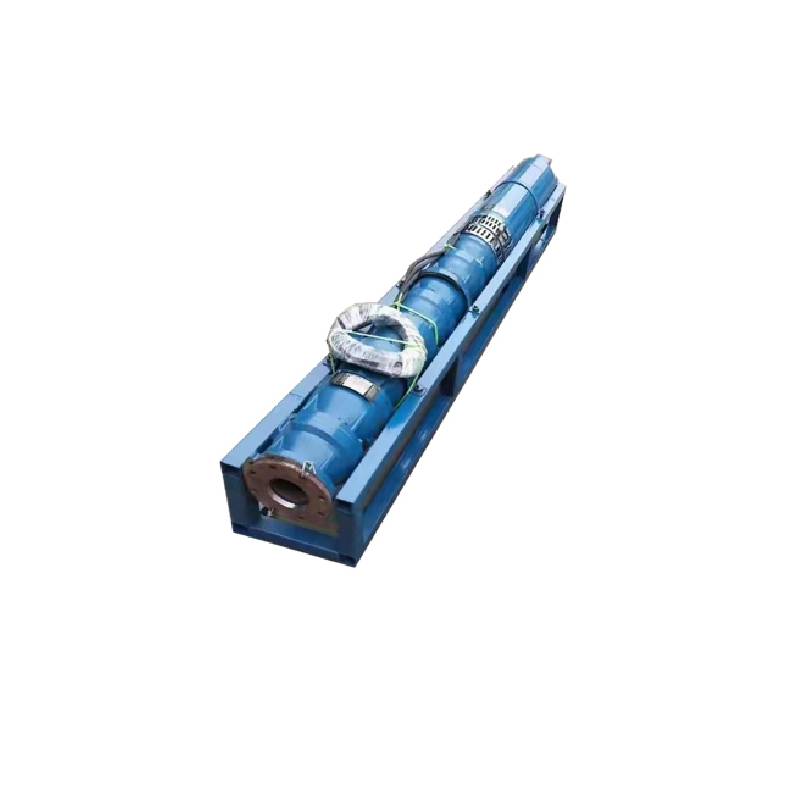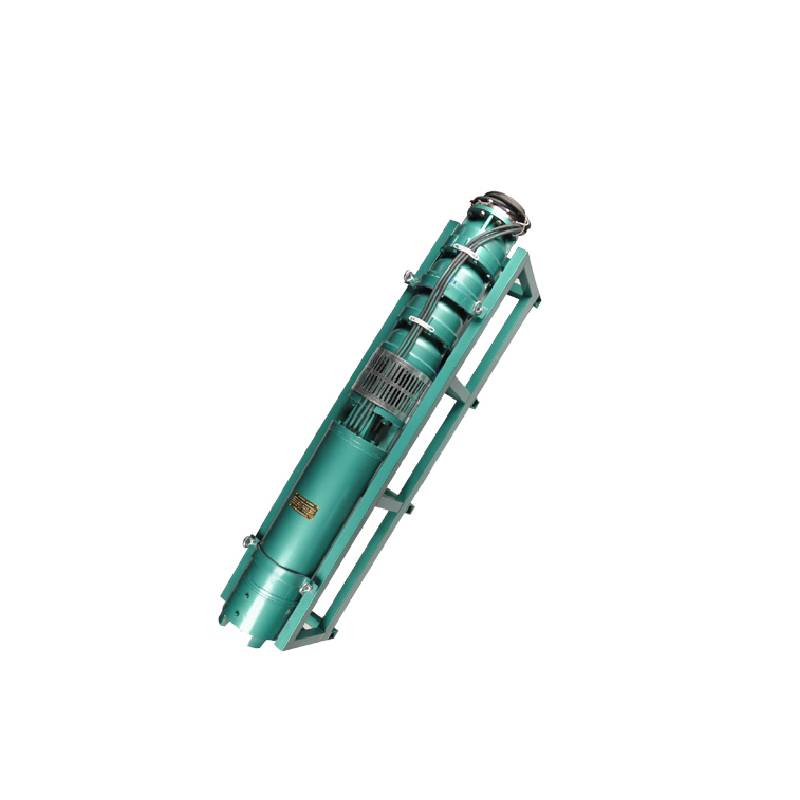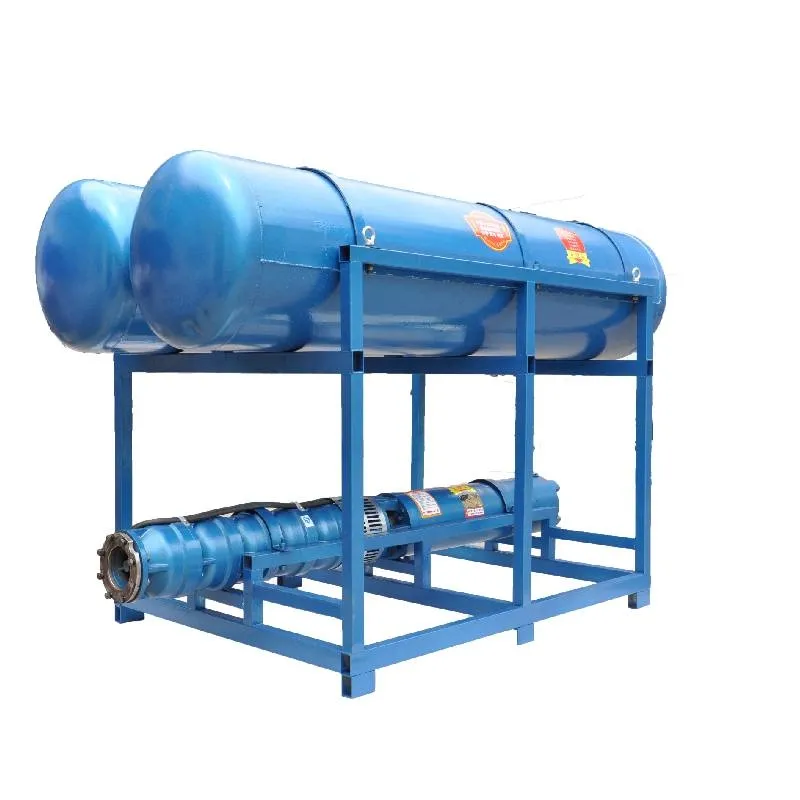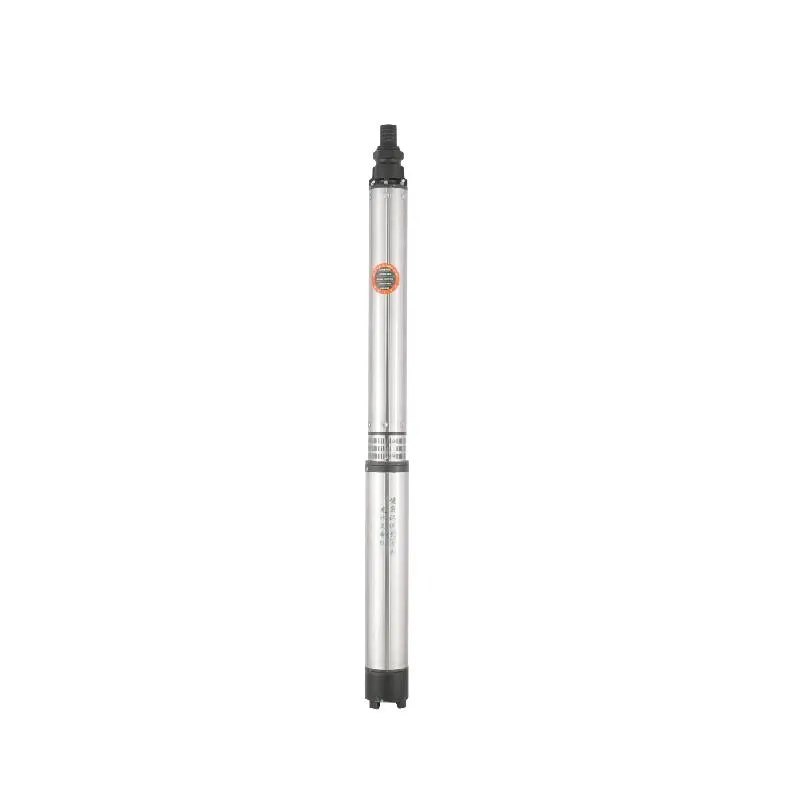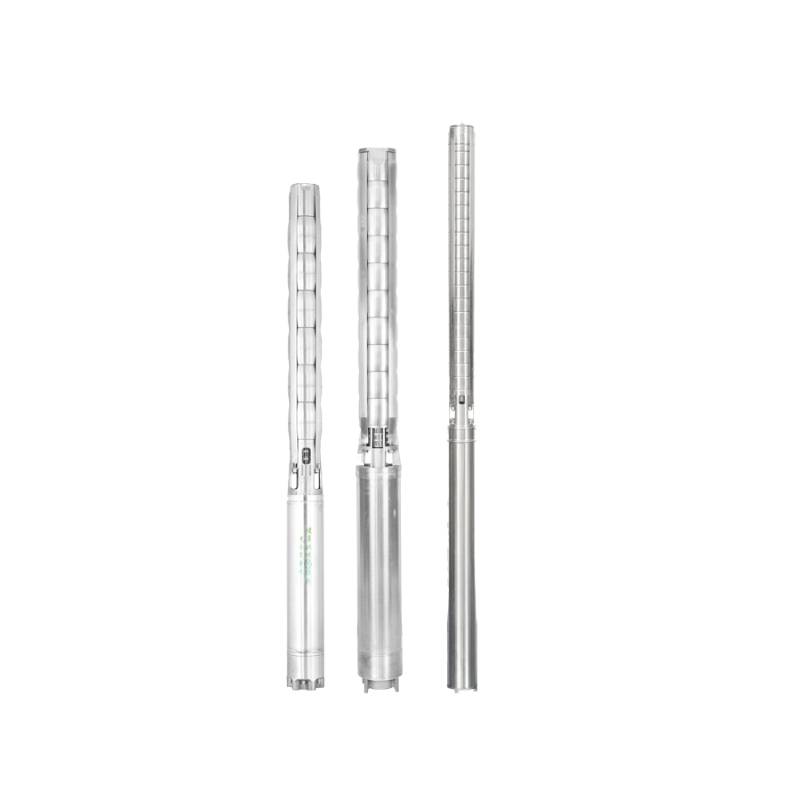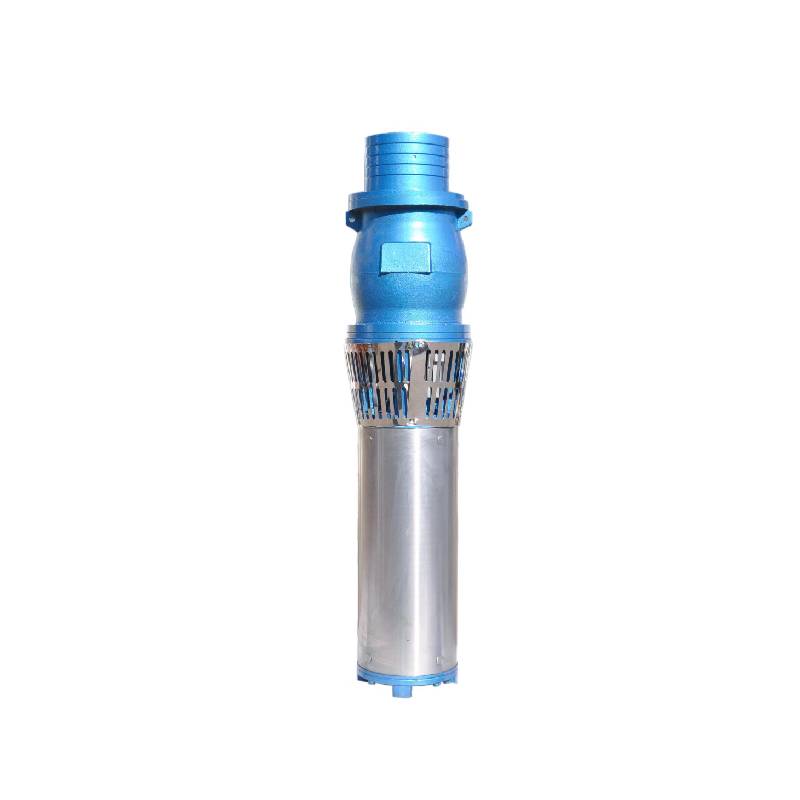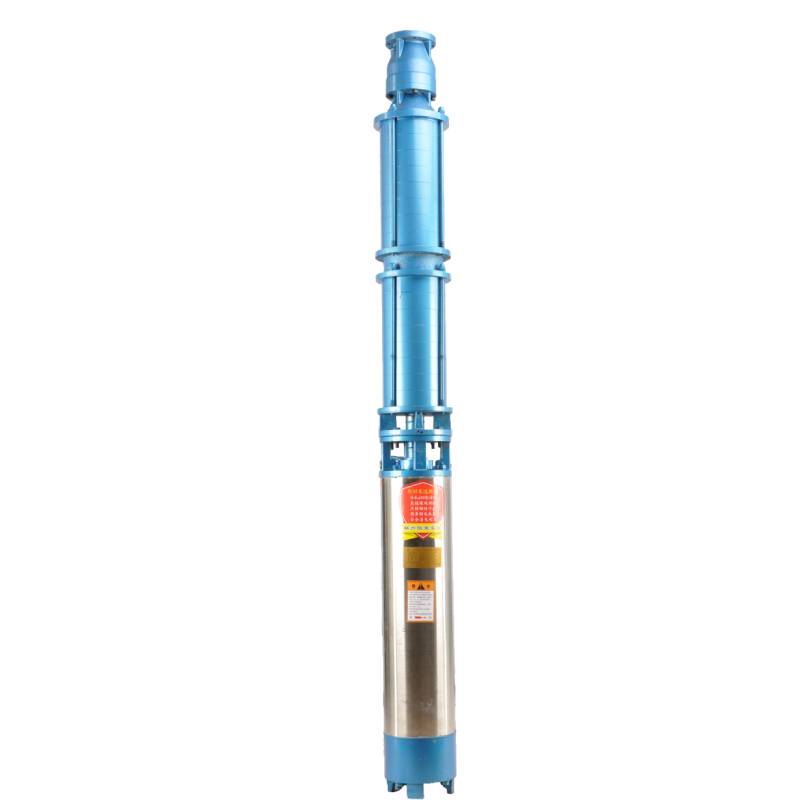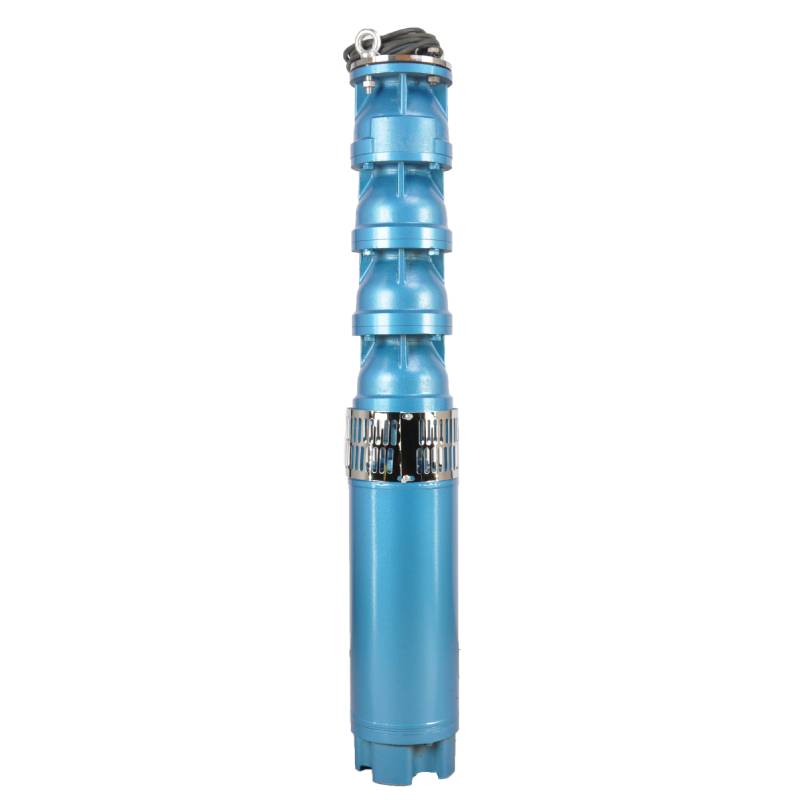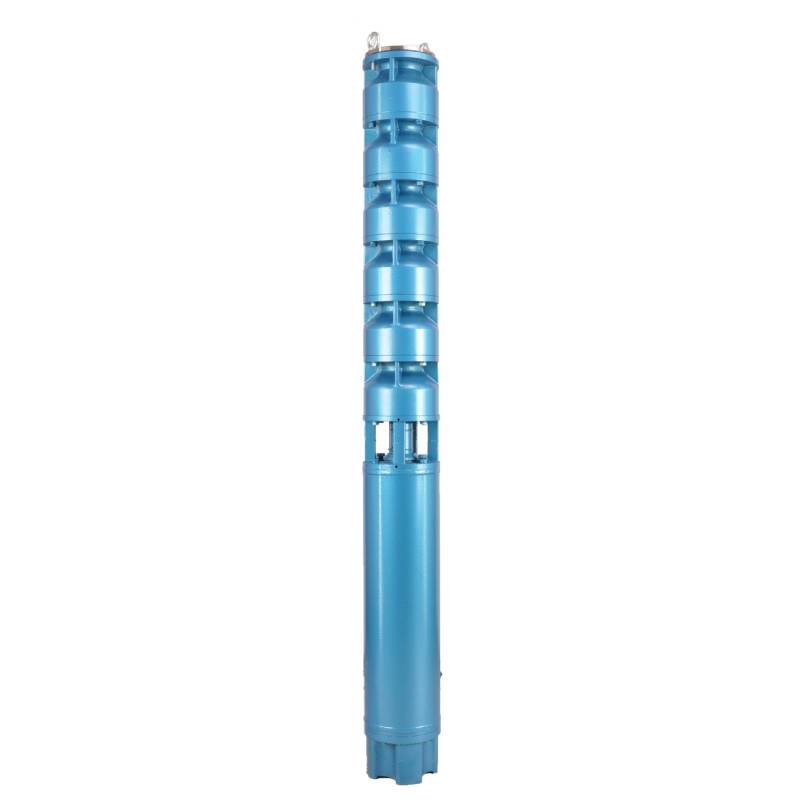QJP series special fountain pump is a special fountain pump developed by our factory. The pump motor core is made of high quality cold rolled silicon steel, which makes the pump more efficient, has good magnetic conductivity, and does not produce heat when starting frequently. The two ends of the motor rotor are covered with alloy copper sleeve as lubricant, using water. Stainless steel sleeves replace ball bearings, avoiding the problem of easy rust of ball bearings and the problem of motor burning due to lack of oil wear. It is very suitable for music fountain, all models can be used horizontally.
This product uses three-phase AC 380V power supply (tolerance + 5%), 50HZ frequency (tolerance + 1%); the applicable water quality conditions for water temperature is not higher than 20 °C, solid impurities content (mass ratio) is not more than 0.01%, pH value (pH) is 6.5-8.5, hydrogen sulfide content is not more than 1.5mg/L, chloride ion content is not more than 400mg/L. The motor adopts closed or water sealed wet structure, before use must be filled with clean water to prevent virtual filled, and then tighten the water injection and air exhaust bolts, otherwise not to use. Submersible pump must be completely immersed in water to work, immersion depth shall not exceed 70 meters, the distance between the bottom of the submersible pump and the bottom of the well shall not be less than 3 meters. The water in the well should be able to meet the water output and continuous operation of the submersible pump, the water output of the pump should be controlled at 0.7-1.2 times the rated flow. The well should be kept vertical, the submersible pump can not be used horizontally or overturned, only vertical installation. The submersible pump must be equipped with cables as required, and equipped with external overload protection device. The pump is strictly prohibited from no water load test.
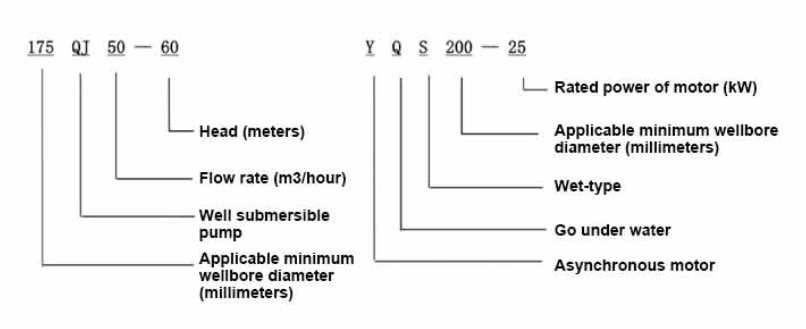
| Model | Llif (m3/h) | Pen (m) |
Cyflymder cylchdroi (newid/pwynt) |
Pwmp dŵr(%) | Allfa diamedr (mm) |
Yn berthnasol yn dda diamedr (mm) |
Wedi'i raddio power(KW) |
Wedi'i raddio foltedd(V) |
Wedi'i raddio cerrynt (A) |
Effeithlonrwydd modur (%) | power factorcosφ | Uned Maint mwyaf rheiddiol (mm) |
Sylw | |||||||||
| 200QJ20-40 | 20 | 40 | 2850 | 66 | 50 | 200uchod | 4 | 380 | 10.1 | 76.0 | 0.79 | 184 | ||||||||||
| 200QJ20-54 | 54 | 5.5 | 13.6 | 77.0 | 0.8 | |||||||||||||||||
| 200QJ20-81 | 81 | 7.5 | 18.0 | 78.0 | 0.81 | |||||||||||||||||
| 200QJ20-93 | 93 | 9.2 | 21.7 | 78.5 | 0.82 | |||||||||||||||||
| 200QJ20-108 | 108 | 11 | 25.8 | 79.0 | 0.82 | |||||||||||||||||
| 200QJ20-121 | 121 | 13 | 29.8 | 80.0 | 0.83 | |||||||||||||||||
| 200QJ20-148 | 148 | 15 | 33.9 | 81.0 | 0.83 | |||||||||||||||||
| 200QJ20-175 | 175 | 18.5 | 41.6 | 81.5 | 0.83 | |||||||||||||||||
| 200QJ20-202 | 202 | 22 | 48.2 | 82.5 | 0.84 | |||||||||||||||||
| 200QJ20-243 | 243 | 25 | 54.5 | 83.0 | 0.84 | |||||||||||||||||
| 200QJ20-270 | 270 | 30 | 65.4 | 83.0 | 0.84 | |||||||||||||||||
| 200QJ20-360 | 360 | 37 | 79.7 | 84.0 | 0.84 | |||||||||||||||||
| 200QJ20-442 | 442 | 45 | 96.9 | 84.0 | 0.84 | |||||||||||||||||
| 200QJ25-28 | 25 | 28 | 2850 | 68 | 65 | 200uchod | 4 | 380 | 10.1 | 76.0 | 0.79 | 184 | ||||||||||
| 200QJ25-42 | 42 | 5.5 | 13.6 | 77.0 | 0.8 | |||||||||||||||||
| 200QJ25-56 | 56 | 7.5 | 18.0 | 78.0 | 0.81 | |||||||||||||||||
| 200QJ25-70 | 70 | 9.2 | 21.7 | 78.5 | 0.82 | |||||||||||||||||
| 200QJ25-98 | 98 | 11 | 25.8 | 79.0 | 0.82 | |||||||||||||||||
| 200QJ25-112 | 25 | 112 | 2850 | 68 | 65 | 200uchod | 13 | 380 | 29.8 | 80.0 | 0.83 | 184 | ||||||||||
| 200QJ25-126 | 126 | 15 | 33.9 | 81.0 | 0.83 | |||||||||||||||||
| 200QJ25-154 | 154 | 18.5 | 41.6 | 81.5 | 0.83 | |||||||||||||||||
| 200QJ25-182 | 182 | 22 | 48.2 | 82.5 | 0.84 | |||||||||||||||||
| 200QJ25-210 | 210 | 25 | 54.5 | 83.0 | 0.84 | |||||||||||||||||
| 200QJ25-252 | 252 | 30 | 65.4 | 83.0 | 0.84 | |||||||||||||||||
| 200QJ25-308 | 308 | 37 | 79.7 | 84.0 | 0.84 | |||||||||||||||||
| 200QJ25-378 | 378 | 45 | 96.9 | 84.0 | 0.84 | |||||||||||||||||
| 200QJ32-26 | 32 | 26 | 2850 | 70 | 80 | 200uchod | 4 | 380 | 10.1 | 76.0 | 0.79 | 184 | ||||||||||
| 200QJ32-39 | 39 | 5.5 | 13.6 | 77.0 | 0.8 | |||||||||||||||||
| 200QJ32-52 | 52 | 7.5 | 18.0 | 78.0 | 0.81 | |||||||||||||||||
| 200QJ32-65 | 65 | 9.2 | 21.7 | 78.5 | 0.82 | |||||||||||||||||
| 200QJ32-78 | 78 | 11 | 25.8 | 79.0 | 0.82 | |||||||||||||||||
| 200QJ32-91 | 91 | 13 | 29.8 | 80.0 | 0.83 | |||||||||||||||||
| 200QJ32-104 | 104 | 15 | 33.9 | 81.0 | 0.83 | |||||||||||||||||
| 200QJ32-130 | 130 | 18.5 | 41.6 | 81.5 | 0.83 | |||||||||||||||||
| 200QJ32-143 | 143 | 22 | 48.2 | 82.5 | 0.84 | |||||||||||||||||
| 200QJ32-169 | 169 | 25 | 54.5 | 83.0 | 0.84 | |||||||||||||||||
| 200QJ32-195 | 195 | 30 | 65.4 | 83.0 | 0.84 | |||||||||||||||||
| 200QJ32-247 | 247 | 37 | 79.7 | 84.0 | 0.84 | |||||||||||||||||
| 200QJ32-299 | 299 | 45 | 96.9 | 84.0 | 0.84 | |||||||||||||||||
| 200QJ40-26 | 40 | 26 | 2850 | 72 | 80 | 200uchod | 5.5 | 380 | 13.6 | 77.0 | 0.8 | 184 | ||||||||||
| 200QJ40-39 | 39 | 7.5 | 18.0 | 78.0 | 0.81 | |||||||||||||||||
| 200QJ40-52 | 52 | 9.2 | 21.7 | 78.5 | 0.82 | |||||||||||||||||
| 200QJ40-65 | 65 | 11 | 25.8 | 79.0 | 0.82 | |||||||||||||||||
| 200QJ40-78 | 78 | 15 | 33.9 | 81.0 | 0.83 | |||||||||||||||||
| 200QJ40-104 | 104 | 18.5 | 41.6 | 81.5 | 0.83 | |||||||||||||||||
| 200QJ40-117 | 117 | 22 | 48.2 | 82.5 | 0.84 | |||||||||||||||||
| 200QJ40-143 | 143 | 25 | 54.5 | 83.0 | 0.84 | |||||||||||||||||
| 200QJ40-169 | 169 | 30 | 65.4 | 83.0 | 0.84 | |||||||||||||||||
| 200QJ40-208 | 208 | 37 | 79.7 | 84.0 | 0.84 | |||||||||||||||||
| 200QJ40-247 | 247 | 45 | 96.9 | 84.0 | 0.84 | |||||||||||||||||
| 200QJ50-26 | 50 | 26 | 2850 | 74 | 80 | 200uchod | 5.5 | 380 | 13.6 | 77.0 | 0.8 | 184 | ||||||||||
| 200QJ50-39 | 39 | 9.2 | 21.7 | 78.5 | 0.82 | |||||||||||||||||
| 200QJ50-52 | 52 | 11 | 25.8 | 79.0 | 0.82 | |||||||||||||||||
| 200QJ50-65 | 65 | 15 | 33.9 | 81.0 | 0.83 | |||||||||||||||||
| 200QJ50-78 | 78 | 18.5 | 41.6 | 81.5 | 0.83 | |||||||||||||||||
| 200QJ50-91 | 91 | 22 | 48.2 | 82.5 | 0.84 | |||||||||||||||||
| 200QJ50-104 | 104 | 25 | 54.5 | 83.0 | 0.84 | |||||||||||||||||
| 200QJ50-130 | 130 | 30 | 65.4 | 83.0 | 0.84 | |||||||||||||||||
| 200QJ50-156 | 156 | 37 | 79.7 | 84.0 | 0.84 | |||||||||||||||||
| 200QJ50-208 | 208 | 45 | 96.9 | 84.0 | 0.84 | |||||||||||||||||
| 200QJ63-24 | 63 | 24 | 2850 | 74 | 80 | 200uchod | 7.5 | 380 | 18.0 | 78.0 | 0.81 | 184 | ||||||||||
| 200QJ63-36 | 36 | 11 | 25.8 | 79.0 | 0.82 | |||||||||||||||||
| 200QJ63-60 | 60 | 18.5 | 41.6 | 81.5 | 0.83 | |||||||||||||||||
| 200QJ63-72 | 72 | 22 | 48.2 | 82.5 | 0.84 | |||||||||||||||||
| 200QJ63-84 | 84 | 25 | 54.5 | 83.0 | 0.84 | |||||||||||||||||
| 200QJ63-96 | 96 | 30 | 65.4 | 83.0 | 0.84 | |||||||||||||||||
| 200QJ63-120 | 120 | 37 | 79.7 | 84.0 | 0.84 | |||||||||||||||||
| 200QJ63-144 | 144 | 45 | 96.9 | 84.0 | 0.84 | |||||||||||||||||
| 200QJ80-22 | 80 | 22 | 2850 | 75 | 100 | 200uchod | 7.5 | 380 | 18.0 | 78.0 | 0.81 | 184 | ||||||||||
| 200QJ80-33 | 33 | 11 | 25.8 | 79.0 | 0.82 | |||||||||||||||||
| 200QJ80-44 | 44 | 15 | 33.9 | 81.0 | 0.83 | |||||||||||||||||
| 200QJ80-55 | 55 | 18.5 | 41.6 | 81.5 | 0.83 | |||||||||||||||||
| 200QJ80-66 | 66 | 22 | 48.2 | 82.5 | 0.84 | |||||||||||||||||
| 200QJ80-88 | 88 | 30 | 65.4 | 83.0 | 0.84 | |||||||||||||||||
| 200QJ80-99 | 99 | 37 | 79.7 | 84.0 | 0.84 | |||||||||||||||||
| 200QJ80-121 | 121 | 45 | 96.9 | 84.0 | 0.84 | |||||||||||||||||
| 200QJ100-18 | 100 | 18 | 2850 | 75 | 100 | 200uchod | 9.2 | 380 | 21.7 | 78.5 | 0.82 | 184 | ||||||||||
| 200QJ100-27 | 27 | 13 | 29.8 | 80.0 | 0.83 | |||||||||||||||||
| 200QJ100-36 | 36 | 18.5 | 41.6 | 81.5 | 0.83 | |||||||||||||||||
| 200QJ100-45 | 45 | 22 | 48.2 | 82.5 | 0.84 | |||||||||||||||||
| 200QJ100-54 | 54 | 25 | 54.5 | 83.0 | 0.84 | |||||||||||||||||
| 200QJ100-63 | 63 | 30 | 65.4 | 83.0 | 0.84 | |||||||||||||||||
| 200QJ100-72 | 100 | 72 | 2850 | 75 | 100 | 200uchod | 37 | 380 | 79.7 | 84.0 | 0.84 | 184 | ||||||||||
| 200QJ100-90 | 90 | 45 | 96.9 | 84.0 | 0.84 | |||||||||||||||||
Well submersible pump is a kind of fresh water pump, it is strictly prohibited to dig new wells and pump mud and sand. The product adopts 380/50HZ voltage grade, other voltage grades shall not be used, and the submersible motor needs to be customized. Underground cables must use waterproof cables, and must be equipped with starting equipment, such as distribution box, etc. The starting equipment shall have common motor comprehensive protection functions, such as short circuit overload protection, phase loss protection, undervoltage protection, grounding protection and no-load protection, etc. In abnormal cases, the protection device shall be tripped in time. When installed and used, the pump must be reliably grounded, it is prohibited to push and pull the switch when hands and feet are wet, and the power supply must be cut off before installation and maintenance of the pump. In the place where the pump is used, an obvious "anti-electric shock" sign must be set up. Before going down the well or installing, the motor must be filled with distilled water or non-corrosive clean cold water, and the water adding/discharge bolts must be tightened. When testing the pump on the ground, water must be injected into the pump chamber to lubricate the rubber bearings. The instantaneous start time shall not exceed one second to check whether the steering is correct, pay attention to safety, and prevent the pump from toppling and injuring people when it is upright. In strict accordance with the specified lift and flow range of the pump, to prevent the pump in low lift with large flow or in high lift with large traction, resulting in extreme wear of thrust bearings and other components, the motor overload and burn. After the pump into the well, the motor to the ground insulation resistance should be measured not less than 100MΩ. After the start, regular observation of voltage and current, and check whether the motor winding insulation meets the requirements; if the location of the pump storage temperature below freezing, should discharge the water in the motor cavity, to prevent water in the motor cavity ice and damage the motor due to low temperature.
Cyflwyniad byr o'r strwythur: mae rhan pwmp yn cynnwys siafft pwmp yn bennaf, impeller, cragen dargyfeirio, dwyn rwber, corff falf gwirio (rhannau dewisol) a rhan cydrannau eraill. , sedd dwyn canllaw is, stator, rotor, sedd dwyn canllaw uchaf, cylch tywod, adran fewnfa dŵr, cebl a chydrannau eraill.
Mae prif nodweddion y cynnyrch yn cynnwys:
1, Mae'r modur yn fodur asyncronig tri cham tanddwr gwlyb llawn dŵr, mae'r ceudod modur yn llawn dŵr glân, a ddefnyddir i oeri'r modur ac iro'r dwyn, defnyddir y ffilm sy'n rheoleiddio pwysau ar waelod y modur i addasu gwahaniaeth pwysedd ehangu a chrebachu y dŵr y tu mewn i'r corff a achosir gan newid cynnydd tymheredd y modur.
2, Er mwyn atal y tywod yn y dŵr ffynnon rhag mynd i mewn i'r modur, mae dwy sêl olew ar ben uchaf y siafft modur, ac mae cylch tywod wedi'i osod i ffurfio strwythur atal tywod.
3, Er mwyn atal y siafft pwmp rhag rhedeg i fyny wrth gychwyn, mae'r siafft pwmp a'r siafft modur wedi'u cysylltu gan gyplu, a gosodir dwyn byrdwn uchaf ar ran isaf y modur.
4, Mae iro'r modur a'r dwyn pwmp yn iro dŵr.
5, Mae'r weindio stator modur wedi'i wneud o wifren dirwyn modur tanddwr o ansawdd uchel, gyda pherfformiad inswleiddio uchel.
6, Mae'r pwmp wedi'i ddylunio gan gyfrifiadur CAD, gyda strwythur syml a pherfformiad technegol da.

(1) Paratoi cyn gosod:
1. Gwiriwch a yw'r pwmp tanddwr yn bodloni'r amodau defnydd a'r cwmpas a nodir yn y llawlyfr.
2. Gan ddefnyddio gwrthrych trwm gyda diamedr sy'n hafal i diamedr allanol uchaf y pwmp tanddwr, mesurwch a all diamedr mewnol y ffynnon ffitio'r pwmp tanddwr, a mesur a yw dyfnder y ffynnon yn bodloni'r gofynion gosod.
3. Gwiriwch a yw tyllu'r ffynnon yn lân ac a yw dŵr y ffynnon yn gymylog. Peidiwch byth â defnyddio pwmp trydan tanddwr i olchi mwd y pwmp welor a dŵr tywod er mwyn osgoi niwed cynamserol i'r pwmp trydan tanddwr.
4. Gwiriwch a yw lleoliad y clamp gosod welhead yn addas ac a all wrthsefyll ansawdd yr uned gyfan
5. Gwiriwch a yw'r cydrannau pwmp tanddwr wedi'u cwblhau a'u gosod yn iawn yn ôl y diagram cydosod yn y llawlyfr Tynnwch y sgrin hidlo a chylchdroi'r cyplydd i weld a yw'n cylchdroi yn hyblyg
6. Dadsgriwiwch y sgriw dŵr a llenwi'r ceudod modur â dŵr glân nad yw'n cyrydol (noder. gwnewch yn siŵr ei ffiltro), yna tynhau'r sgriw dŵr. Ar ôl 12 awr o chwistrelliad dŵr, ni ddylai ymwrthedd inswleiddio'r modur fod yn llai na 150M Q wrth ei fesur gyda bwrdd ysgwyd 500V.
7. Cable joint, cut off a 120mm rubber sleeve from one end of the outgoing cable and the matching cable with an electrician's knifethen stagger the length of the three core wires in a stepped shape, peel off a 20mm copper core, scrape of the oxide layer on theoutside of the copper wire with a knife or sand cloth, and insert the two connected wire ends in palirs.After tying the layer tightly with fine copper wire, solder it thoroughly and firmly, and sand of any. burrs on the surface. Then, forthe three joints, use polyvester insulation tape to wrap them in a semi stacked manner for three lavers. Wrap the two ends of thewrapping layer tightywith nyion thread,and then use a semi stacked method to wrap the tape for three layers. Wrap the outellayer with high-pressure insulation tape for three layers. Finally, fold the threestrands together and repeatedly wrap them for fivelayers with high-pressure tape. Each layer must be tightly tied, and the interlayer joints must be tight and fimm to prevent water frompenetrating and damaging the insulation, After wrapping, soak in water at room temperature of 20 ’c for 12 hours, and measurethe insulation resistance with a shaking table, which should not be less than 100M Ω
Mae'r diagram proses gwifrau cebl ynghlwm fel a ganlyn:
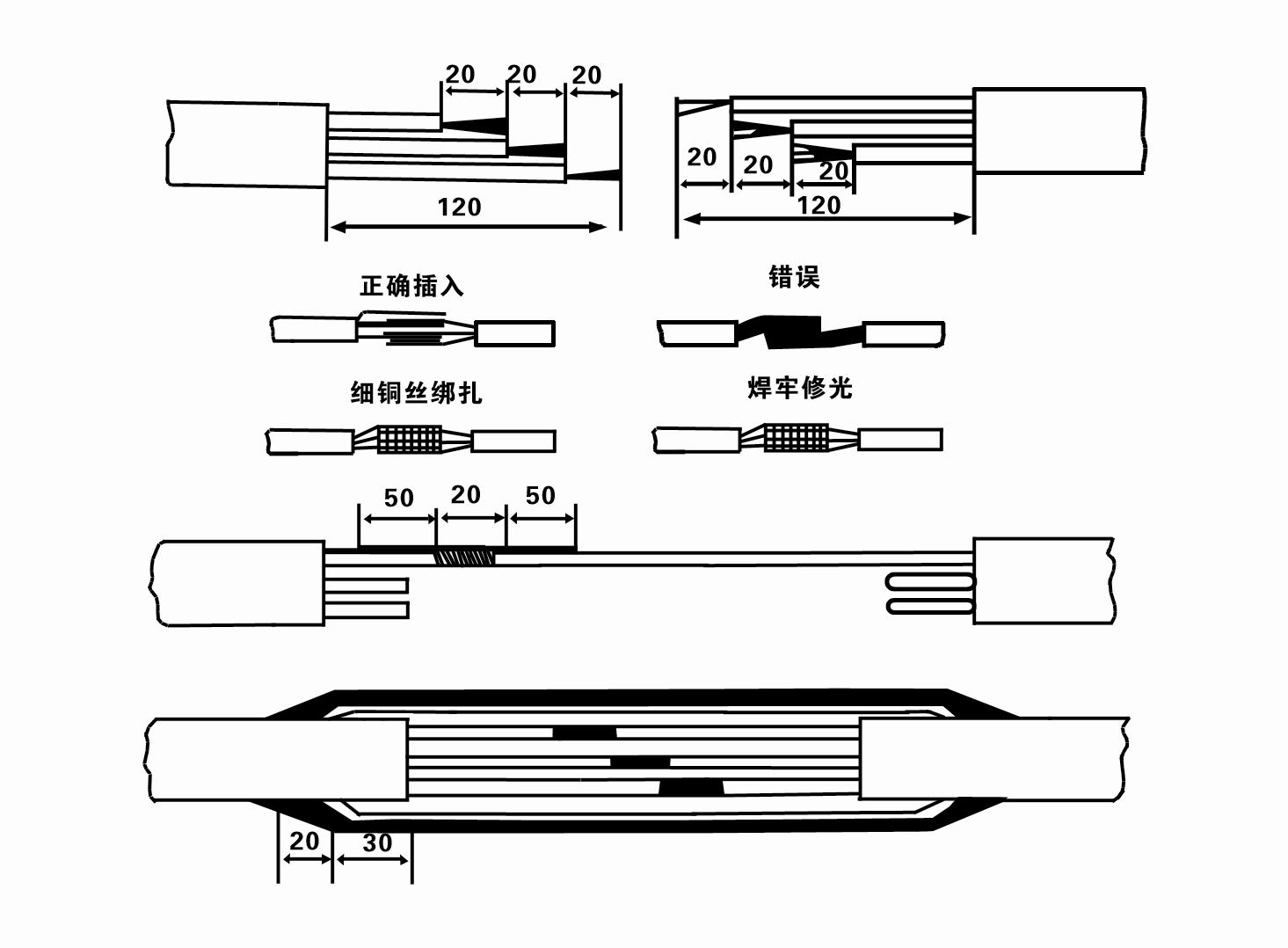
8. Defnyddiwch amlfesurydd i wirio a yw'r gwifrau tri cham wedi'u cysylltu ac a yw'r gwrthiant DC yn gyfartal yn fras.
9. Gwiriwch a yw'r cylched a chynhwysedd y trawsnewidydd yn cael eu gorlwytho, ac yna cysylltu'r switsh amddiffyn gorlwytho neu'r offer cychwyn. Gweler Tabl 2 am fodelau penodol, ac yna Arllwyswch bwced o ddŵr i'r pwmp dŵr o'r allfa pwmp dŵr i iro'r Bearings rwber yn y pwmp, ac yna gosodwch y pwmp trydan tanddwr yn unionsyth ac yn gyson.Start (dim mwy nag un eiliad) a gwirio a yw'r cyfeiriad llywio yn gyson â'r arwydd llywio. Os na, cyfnewidiwch unrhyw ddau gysylltydd o'r cebl tri cham. Yna gosodwch yr hidlydd a pharatowch i fynd i lawr y ffynnon. Os caiff ei ddefnyddio mewn achlysuron arbennig (fel ffosydd, ffosydd, afonydd, pyllau, pyllau, ac ati), rhaid i'r pwmp trydan gael ei seilio'n ddibynadwy.
(2) Offer ac offer gosod:
1. Un pâr o gadwyni codi am fwy na dwy dunnell.
2. Trybedd gydag uchder fertigol o ddim llai na phedwar metr.
3. Dau raff hongian (rhaffau gwifren) sy'n gallu dwyn pwysau o fwy nag un tunnell (gall ddwyn pwysau set gyflawn o bympiau dŵr).
4. Gosod dau bâr o clampiau (splints).
5. Wrenches, morthwylion, sgriwdreifers, offer trydanol ac offerynnau, ac ati.
(3) Gosod pwmp trydan:
1. Dangosir diagram gosod y pwmp trydan tanddwr yn Ffigur 2. Dangosir y dimensiynau gosod penodol yn Nhabl 3 "Rhestr o Dimensiynau Gosod y Pwmp Trydan Tanddwr".
2. Gellir codi pympiau trydan tanddwr â phen llai na 30 metr yn uniongyrchol i'r ffynnon gan ddefnyddio pibellau a rhaffau gwifren neu rhaffau cywarch eraill a all ddwyn pwysau llawn y peiriant cyfan, pibellau dŵr, a dŵr yn y pibellau.
3. Mae pympiau â phen o fwy na 30 metr yn defnyddio pibellau dur, ac mae'r dilyniant gosod fel a ganlyn:
①Defnyddiwch clamp i glampio pen uchaf rhan y pwmp dŵr (mae'r modur a'r pwmp dŵr wedi'u cysylltu ar hyn o bryd), codwch ef â chadwyn hongian, a'i glymu'n araf i mewn i'r ffynnon nes i chi roi'r clamp ar ben y ffynnon a thynnu'r cadwyn hongian.
② Defnyddiwch bâr arall o clampiau i glampio pibell, ei godi â chadwyn hongian 15 cm i ffwrdd o'r fflans, a'i ostwng yn araf. Rhwng fflans pibell a fflans pwmp Rhowch y pad rwber yn ei le a thynhau'r bibell a'r pwmp yn gyfartal â bolltau, cnau a wasieri gwanwyn.
③ Codwch y pwmp tanddwr ychydig, tynnwch y clamp ar ben uchaf y pwmp dŵr, clymwch y cebl yn gadarn i'r bibell ddŵr gyda thâp plastig, a'i glymu'n araf nes bod y clamp wedi'i osod ar ben y ffynnon.
④ Defnyddiwch yr un dull i glymu'r holl bibellau dŵr i'r ffynnon.
⑤ Ar ôl i'r cebl plwm-allan gael ei gysylltu â'r switsh rheoli, mae'n gysylltiedig â'r cyflenwad pŵer tri cham.
(4) Pethau i'w nodi yn ystod y gosodiad:
1. Os canfyddir ffenomen jamio yn ystod y broses bwmpio, trowch neu tynnwch y bibell ddŵr i oresgyn y pwynt jamio. Os nad yw mesurau amrywiol yn gweithio o hyd, peidiwch â gorfodi'r pwmp i lawr er mwyn osgoi difrod i'r pwmp trydan tanddwr a'r ffynnon.
2. Yn ystod y gosodiad, dylid gosod pad rwber ar fflans pob pibell a'i dynhau'n gyfartal.
3. Pan fydd y pwmp dŵr yn cael ei ostwng i'r ffynnon, dylid ei osod yng nghanol pibell y ffynnon i atal y pwmp rhag rhedeg yn erbyn wal y ffynnon am amser hir, gan achosi'r pwmp i ddirgrynu a'r modur i ysgubo a llosgi .
4. Darganfyddwch ddyfnder y pwmp dŵr i waelod y ffynnon yn ôl amodau tywod a silt y ffynnon sy'n llifo. Peidiwch â chladdu'r pwmp yn y mwd. Yn gyffredinol, nid yw'r pellter o'r pwmp dŵr i waelod y ffynnon yn llai na 3 metr (gweler Ffigur 2).
5. Ni ddylai dyfnder mynediad dŵr y pwmp dŵr fod yn llai na 1-1.5 metr o lefel y dŵr deinamig i'r nod mewnfa dŵr (gweler Ffigur 2). Fel arall, gall y Bearings pwmp dŵr gael eu niweidio'n hawdd.
6. Ni all lifft y pwmp dŵr fod yn rhy isel. Fel arall, mae angen gosod falf giât ar bibell ddŵr y ffynnon i reoli llif y pwmp ar y pwynt llif graddedig i atal y modur rhag cael ei orlwytho a'i losgi oherwydd cyfraddau llif mawr.
7. Pan fydd y pwmp dŵr yn rhedeg, dylai'r allbwn dŵr fod yn barhaus a hyd yn oed, dylai'r presennol fod yn sefydlog (o dan amodau gwaith graddedig, yn gyffredinol dim mwy na 10% o'r cerrynt graddedig), ac ni ddylai fod unrhyw ddirgryniad na sŵn. Os oes unrhyw annormaledd, dylid stopio'r peiriant i ddarganfod yr achos a'i ddileu.
8. Wrth osod, rhowch sylw i osodiad y wifren sylfaen modur (gweler Ffigur 2). Pan fydd y bibell ddŵr yn bibell ddur, ei harwain o'r clamp pen ffynnon; pan fydd y bibell ddŵr yn bibell blastig, ei arwain o farc sylfaen y pwmp trydan.
- 1.Ar ôl gosod y pwmp tanddwr, gwiriwch y gwrthiant inswleiddio a dargludiad tri cham o'r switsh eto, gwiriwch a yw'r offeryn a chysylltiad yr offer cychwyn yn anghywir, os nad oes problem, gellir cychwyn y peiriant prawf, ac arsylwi a yw darlleniadau dangosydd yr offeryn yn fwy na'r foltedd graddedig a'r cerrynt a nodir ar y plât enw ar ôl y cychwyn, ac arsylwi a oes gan y pwmp ffenomen sŵn a dirgryniad, a'i roi ar waith os yw popeth yn normal.
- 2.Ar ôl gweithrediad cyntaf y pwmp am bedair awr, dylai'r modur gael ei gau i lawr i brofi'r ymwrthedd inswleiddio thermol yn gyflym, ac ni ddylai ei werth fod yn llai na 0.5 megaohm.
- 3.Ar ôl i'r pwmp gael ei gau i lawr, dylid ei gychwyn ar ôl pum munud i atal y golofn ddŵr yn y bibell rhag cael ei hail-lifo'n llwyr ac achosi cerrynt modur gormodol a llosg.
- 4.Ar ôl i'r pwmp gael ei roi ar waith yn normal, er mwyn ymestyn ei fywyd gwasanaeth, mae angen gwirio a yw'r foltedd cyflenwad, cerrynt gweithio a gwrthiant inswleiddio yn normal yn rheolaidd. Os canfyddir yr amodau canlynol, dylid cau'r pwmp ar unwaith i ddatrys problemau.
- 1 In the rated condition, the current exceeds 20%.
- 2 Mae lefel y dŵr deinamig yn disgyn i'r adran fewnfa dŵr, gan achosi dŵr ysbeidiol.
- 3 Mae gan y pwmp tanddwr ddirgryniad neu sŵn difrifol.
- 4 Mae foltedd y cyflenwad yn is na 340 folt.
- 5 Mae ffiws yn cael ei losgi allan.
- 6 Mae'r bibell cyflenwi dŵr wedi'i difrodi.
- 7 The motor's thermal insulation resistance is lower than 0.5 megaohm.
- Unit disassembly:
- 1.Untie the cable tie, remove the pipeline part, and remove the wire plate.
- 2.screw down the water bolt, put the water in the motor chamber.
- 3.remove the filter, loose the fixed screw on the coupling to fix the motor shaft.
- 4.screw down the bolt connecting the water inlet section with the motor, and separate the pump from the motor (pay attention to the unit cushion when separating, to prevent the bending of the pump shaft)
- 5.the disassembly sequence of the pump is: (see figure 1) water inlet section, impeller, diversion shell, impeller...... check valve body, when removing the impeller, use special tools to loosen the conical sleeve of the fixed impeller first, and avoid bending and bruising the pump shaft in the process of disassembly.
- 6.the disassembly process of the motor is: (see figure 1) place the motor on the platform, and remove the nuts, base, shaft head locking nut, thrust plate, key, lower guide bearing seat and double head bolt from the bottom of the motor in turn, and then take out the rotor (pay attention not to damage the wire package) and finally remove the connecting section and upper guide bearing seat.
- 7.unit assembly: before assembly, the rust and dirt of the parts should be cleaned, and the mating surface and fasteners coated with sealant, and then assembled in the opposite order of disassembly (the motor shaft moves up and down after assembly for about one millimeter), after assembly, the coupling should be flexible, and then the filter screen test machine. Submersible pumps shall be taken out of the well for dismantling and maintenance according to Article 5 after a year of operation, or less than a year of operation but two years of diving time, and the worn parts shall be replaced.
This product is a submersible pump, which is suitable for various water areas, such as home, agriculture and industry.In order to prevent the motor from freezing in winter, be sure to discharge all the water in the pump chamber, and roll and tie the cable well.In addition, a room without corrosive substances and gases and with a temperature below 40 °C should be selected for storage.When not in use for a long time, special attention should be paid to the rust prevention of the submersible pump.This product is exquisitely designed and convenient to use, which can help users efficiently deal with various water needs, and is an ideal choice for your home and industrial water.
- Impeller
- Llawes siafft
- Llawes siafft rwber
-
Modrwy selio
01 Cymeriant dŵr ffynnon dwfn
02 Cyflenwad dŵr uchel
03 cyflenwad dŵr mynydd
04 twr dwr
05 Dyfrhau amaethyddol
06 dyfrhau gardd
07 cymeriant dŵr afon
08 dŵr domestig

